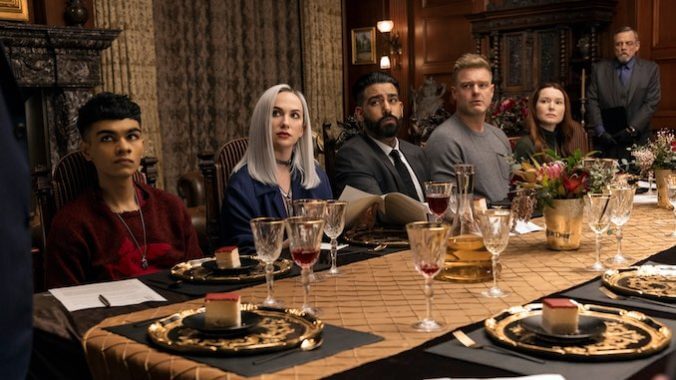The Fall of the House of Usher: Mike Flanagan’s Unhinged Edgar Allan Poe Mashup Is Dark and Lyrical
Photo Courtesy of Netflix
The Fall of the House of Usher is most likely creator Mike Flanagan’s last horror series for Netflix, and while the idea of him getting Amazon dollars to take a crack at Stephen King’s seemingly eternally unadaptable The Dark Tower novels is certainly (extremely) appealing, it’s difficult not to mourn this loss. No one else in this space (or, let’s face it, on this streamer) is doing what Flanagan does, mining our deepest emotional fears and unspoken desires for the sort of real-life nightmare fuel that’s much, much scarier than any monster under the bed. Through stories that wrestle with everything from questions of faith and belief to falling in love and what it means to truly die, Flanagan’s deeply human horror universe is truly something beautiful to behold. Happily, if this really is the end, he’s certainly going out with a bang, bringing back upwards of twenty of the actors who have appeared in properties ranging from The Haunting of Hill House to Gerald’s Game, for a big, splashy, and often completely unhinged ode to OG horror maestro Edgar Allan Poe.
Though the series is primarily grounded in Poe’s titular short story of the Usher siblings, Flanagan deftly mixes in elements from many of the author’s other famous works, including “The Tell-Tale Heart,” “The Raven,” “The Murders in the Rue Morgue,” “The Masque of the Red Death,” “The Black Cat,” and more. Episodes are freely littered with Poe references large and small, from character names to full-on poetry recitations—that this show is probably going to introduce so many people to “The City in the Sea” is a particular delight—and the series’ larger story reflects the author’s lifelong fascination with themes of guilt, death, paranoia, obsession, and delusion.
Like the original work the series is named after, The Fall of the House of Usher technically follows the story of twins Roderick (Bruce Greenwood) and Madeline (Mary McDonnell). Here, however, the Ushers are a pair of ride-or-die siblings who have done almost everything together throughout their lives. They have survived a traumatic childhood, an abusive spell in the foster system, poverty, humiliation, and despair. They have lied, schemed, betrayed those who cared about them, and even done murder, all to earn their place together as heads of Fortunato Pharmaceuticals, a gambit that has made them successful beyond their wildest dreams.
Sure, their grand plans of changing the world for the better have basically devolved into selling a slightly nicer but possibly even more addictive version of oxycontin to the masses and Roderick’s six children have all grown up to be hyper-competitive try-hards painfully desperate for dad’s approval, but the fact that the Usher siblings have turned their scrappy little twosome into an empire is something they’re rightfully proud of. But when the heirs begin to die under mysterious (and increasingly gruesome) circumstances, seemingly at the hands of a mysterious woman from Roderick and Madeline’s past, it seems as though darker forces than simple corporate backstabbing may be at work.
The eight-episode series begins as an older Roderick is recounting his family’s tale of tragedy by way of an extended fireside confession to C. Auguste Dupin (Carl Lumbly), the prosecutor who’s been trying to bring the so-called “Usher Crime Family” down for decades and hold them accountable for the many lives lost to their products. His reasons for telling this story—and for telling it to this specific person—are revealed over the course of the series, which unfolds in split timelines that detail both Roderick and Madeline’s youth (with the young Ushers played by Zach Gilford and Willa Fitzgerald) and the increasingly disturbing and horrific deaths of each of his children.
One part horror-tinged Succession knockoff and one part modern day morality play, The Fall of the House of Usher is both a darkly comedic excoriation of the uber-rich and a slow-moving emotional car crash that explores the dysfunction at the heart of a family that’s losing its members one by one. The fact that Usher tells its audience pretty much immediately all the kids are dead by the show’s end renders them strangely sympathetic, even as most of them commit a string of objectively horrible actions. (It also allows us, as viewers, to revel in their worst deeds without apology—after all, if they’re not long for this world, we all might as well have some fun!)
-

-

-

-

-

-

-

-

-

-

-

-

-

-

-

-

-

-

-

-

-

-

-

-

-

-

-

-

-

-

-

-

-

-

-

-

-

-

-

-








































